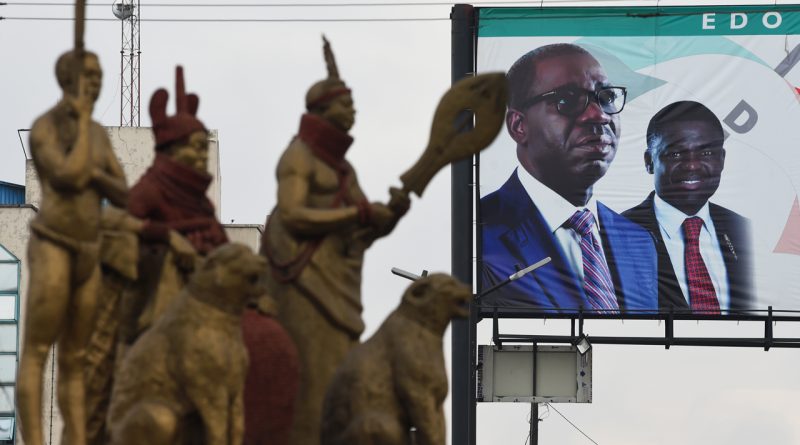Edo State politics: Whither Esan people? – Part 2 | The Guardian Nigeria News – Nigeria and World News — Opinion — The Guardian Nigeria News – Nigeria and World News – Guardian Nigeria

The reality accords with Henry Bienen’s assertion in a review essay to the effect that “….political development in Africa should not be confused with dramatic change at the government or party level; indeed, the more things change, the more they stay the same in the centralization and scope of authority”. To be sure, that political actors are like the ambition ladder captured by William Shakespeare in Julius Caesar once they achieve the height of power on the back of the masses, they turn their back afterwards.
A very important question is: how may we characterise the Esan political actors in the broad canvas of the contradictory dynamics of Nigeria’s politics that I have painted in the foregoing? They are more or less the same. The so-called political leaders received lucre from the system and encourage accumulation without production. This has also affected the psyche of the broad Esan electorate though there is a redeeming feature of the Esan people. The effect of the nature of politics on the electorate is captured by the Kenyan public intellectual, Prof. PLO Lumumba who observed that:
I held 250 town hall meetings I articulated solutions to our problems in my constituency. My opponents did not campaign at all. He gathered money and showed up one day for elections. He distributed money. He won. Africans are not moved by ideas. Their stomach leads them”.
While the above may be viewed as overgeneralization, it holds in certain situations and less so in others. However, the central argument here is that the Esan people possess the adaze (gentleman) feature; they are people of great integrity who could always overcome effort at compromising their personal, collective, and electoral integrity, despite the prevalence of monetary inducement. Truly, the adaze attitude habours the redemptive vent for the development of the Esan country. The recent slogan, that is, “Edo no bi Lagos” speaks to the Adaze principle of the Esan man.
Nevertheless, the Esan people are currently aggrieved, and talk of marginalisation is rife. Esan Okpa Initiative captured it in its balance sheet of political office allocation at the state and federal levels. It argued that in the prevailing political dispensation, Edo South and Edo North have occupied political positions, namely, Governor of the State (Edo South); Deputy Governor of the State (Edo North); Ambassadorial Position (Edo South & Edo North); Hon. Minister of the Federal Republic of Nigeria (Two from Edo State, One from Edo South and One from Edo North); Secretary to the State Government (Edo South); Chief of Staff to the Governor (Rotates between Edo North & South); Head of the State Civil Service; Many appointees in Key Federal and State Government Agencies.
It noted that the only office ceded to the Esan people is the speakership of the House of Assembly which is dogged by political intrigues. While this has been our lot as a people, I would argue that it happened due to the absence of a centralised clearinghouse or think tank that can articulate the Esan strategic interest, besides the low quality of leadership that is self-serving and bereft of ideas. This is why mapping a pathway for holistic development of the Esan country, and people, becomes imperative.
Envisioning a Development Agenda: A Roadmap
I have talked about the meaning of development, and to achieve that in the Esan country, certain fundamentals must be in place. One is the identification and reification of the Esan persona. The Esan country is agrarian and renowned for its military service to the pre-colonial Benin kingdom. In a concrete sense, Esan people stand for industry and valour. Two is the prioritisation of a coordinating think tank. Esan as a people are independently republican, and their respect for traditional institutions is not tantamount to slavery but we must have a coordinating core with a clearly defined interest. Three is the privileging of infrastructural development to achieve the goal of development. This will entail a conscious development of infrastructure such as roads, rails, light, waterworks, and urban planning. Although these fall within the sphere of the state, within a context of a failing state, communal effort is required.
Imagine an Esan circular road with consequence for urban conurbation.
Four is the transformation of the agricultural sector to realise its inherent value chains which can be developed to turn the Esan country into a manufacturing hub. Once upon a time, Esan had a flourishing cotton industry that was the known linkage of the Benin Empire to the international trade of the Middle Ages. It was so significant that it gained attention in the international congress on tropical agriculture in 1914. What has become of the cotton production in Esan country and the value chains in pre-colonial times? Basically, agro-based industries in Esanland such as the Cassava Processing Factory at Uromi, though moribund, indicates future production trajectory that can capture the entire value chains in the agricultural sector of the Esan economy.
Given a corresponding attention, it could help the Edo state government realise its quest to enter the fold of Africa’s top 20 economies by 2050. Five is the transformation of Esan culture to earn foreign exchange for the Esan country. For example, Igbabonelimhin, the unique acrobatic dance of the Esan people has the potential to generate foreign exchange if well-choreographed. The above are core issues in the development of the Esan country. Their realisation should be part of our strategic interests that should include education of every Esan man and woman, access and presence at decision-making centres of state institutions, and the security of the homeland.
Concluded
Prof. Akhaine delivered this, titled ‘Recent political development in Edo state: Whither Esan people?’ as Keynote Address at the maiden Esan Okpa Assembly, held at Buvel Hotel, Uromi, Esan North East Local Government, Edo, Nigeria, May 7, 2022.

